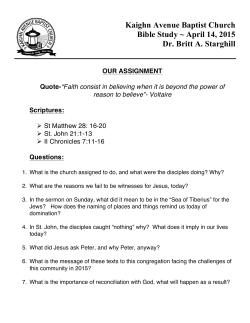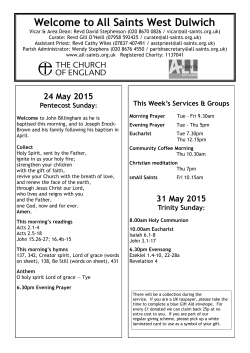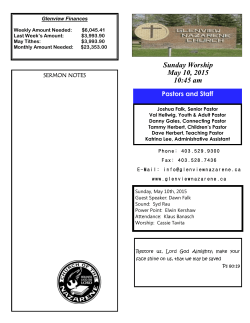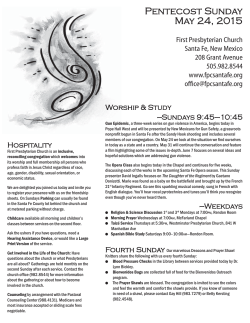
Pentecost - Lexington Presbyterian Church
Pentecost John 20:19-23 & Acts 4:32-35 A sermon by William M. Klein 12 April 2015 32 Now the whole group of those who believed were of one heart and soul, and no one claimed private ownership of any possessions, but everything they owned was held in common. 33 With great power the apostles gave their testimony to the resurrection of the Lord Jesus, and great grace was upon them all. 34 There was not a needy person among them, for as many as owned lands or houses sold them and brought the proceeds of what was sold. 35 They laid it at the apostles' feet, and it was distributed to each as any had need. (Acts 4:32-35 NRSV) 1 I'll bet you did not know today is Pentecost. If you didn't know that, no worries. There are two accounts of Pentecost in the scriptures. The one with which we are most familiar is recorded by Luke in the Acts of the Apostles…and takes place in Jerusalem 50 days after Passover and Easter. The Pentecost story as told in John’s gospel is very different. It takes place, not 50 days after Passover, but Easter evening. It is this second Pentecost story I want us to consider this morning. Before we read the text, though, I want us to understand something about Pentecost. What you may not realize is that Pentecost was a Jewish holiday before it was a Christian one. The term “Pentecost” is the Greek name first given to the Jewish pilgrimage festival known as the Feast of Weeks, held fifty days after Passover to mark the conclusion of the grain harvest.1 For centuries Israel was an agricultural people depending for its sustenance on the produce of the land. Pentecost was a Feast of the Ingathering of the first fruits of the wheat harvest, a thanksgiving festival in which Israel expressed its dependence on God for harvest and daily bread. From every part of the country Jews would stream to Jerusalem to appear before their God. In time, though, when the Jews became dispersed among the nations, Pentecost lost its primary character as a harvest festival, and became known as “the Feast of the Giving of the Law.” Ancient rabbis by careful calculation and time reckoning came to the conclusion God gave the law to Moses on the Day of Pentecost. Being the anniversary of the giving of the Law to Moses on Mt. Sinai, Pentecost was considered as the birthday of Judaism.2 The New Testament church reinterpreted the Jewish holiday in light of events reported by Luke. According to the Lukan account, the Holy Spirit came upon the followers of Jesus as they were observing the Jewish Day of Pentecost…thus the New Testament church reinterpreted its meaning to commemorate God's gift, not of the Law, but of the Spirit. As I said a minute ago, we are most familiar with the Lukan account of Pentecost found in Acts 2. But there is another account of Pentecost – a very different account of 1 God's gift of the Holy Spirit to the church that is found in John’s Gospel. Listen to this lesser-known birth story of the church that takes place Easter Sunday, not fifty days later. 19 When it was evening on that day, the first day of the week, and the doors of the house where the disciples had met were locked for fear of the Jews, Jesus came and stood among them and said, "Peace be with you." 20 After he said this, he showed them his hands and his side. Then the disciples rejoiced when they saw the Lord. 21 Jesus said to them again, "Peace be with you. As the Father has sent me, so I send you." 22 When he had said this, he breathed on them and said to them, "Receive the Holy Spirit. 23 If you forgive the sins of any, they are forgiven them; if you retain the sins of any, they are retained." (Jn. 20:1923 NRSV) 2 According to Luke, fifty days after Passover and Easter there were loads of people in a certain house in Jerusalem and thousands of people in the streets. They had gathered from all over Palestine for the Jewish festival of Pentecost. All of a sudden a violent wind swept through the room. Luke described it as fire shaped into tongues…and the people began to speak in other languages. An astonished crowd gathered around…and the church was born. Luke’s description of the birth of the church hearkens back to Exodus 20. As you may remember, in Exodus 20, the people were at the foot of the mountain of God, Mt. Sinai, and they were afraid. It was a dark and stormy day – and the people said to Moses, “We can’t stand much more of this! You go up there and find out what God wants and come back and tell us.” So Moses went up the mountain. There was violent wind and fire. After many days, Moses returned with the Law, the 10 Commandments. When Luke described the giving of the Holy Spirit to the church, he drew upon Exodus 20 – that powerful wind-driven moment in the history of Israel.3 Since Pentecost was the celebration of the giving of the law, Luke described the giving of the Holy Spirit in a similar way. And just as Pentecost was seen as the birthday of Judaism, so did Luke describe Pentecost as the birthday of the church. 3 The Pentecost story as told by John is very different, isn’t it? First of all, it is quiet. It takes place, not 50 days after Passover, but Easter evening. A number of the disciples are in a room in Jerusalem – perhaps even the room where the Last Supper took place several days earlier. The door is locked because the disciples are scared and confused. Their master had been put to death…but by Mary Magdalene’s accounting, he had risen. Not sure what to believe…they are at the least frightened and so lock the door… and though the door does not open, suddenly the risen Jesus is with them. Christ says, “Peace be with you.” Wouldn’t you like to have seen their faces. Remember, this is Easter evening – they have not yet seen the risen Lord. So, approaching the disciples who are frozen like Roman statues, Jesus shows them the holes in his hands where the nails had been – and his side where the spear had pierced. Then they recognize him and were glad, saying, ”It is the Lord!”4 2 Jesus says it again, “Peace be with you.” Then he spreads over them an important blessing. “As the Father sent me, now I send you. What I have done in my life is now up to you to continue.” And then a strange thing happens that is not recorded in any of the other gospel accounts…Jesus breathes on them. According to John, there is no violent wind, no tongues as of fire, no disciples speaking in foreign languages…just a human breath and a human word, “Receive the Holy Spirit.”5 This too is Pentecost – but when John appeals to Old Testament theology, he doesn’t point to Exodus 20 or to the wind and fire on Mt. Sinai. John describes it in light of another Old Testament story…one found in Genesis 2. In that story God takes a lump of clay and shapes it into what we know as a human figure. The text then reads – “God breathed into its nostrils and it became a living soul.”6 Just as God breathed on the clay and it became a living soul like God…so in this second creation does Christ breathe on his disciples and they receive a Spirit of new life that will send them into all the world. The two Pentecost stories are very different, aren’t they? Curious that the Bible provides us two such different stories of the same event…but then, there are a number of places in which the Bible does that… 4 There is one more piece of John’s Pentecost account for us to consider. By way of the Genesis story, we understand God's breath imparted to the clay something of the life and character of God. In some sense the clay became a living soul “like God.” In like fashion, Jesus’ breath imparts to the disciples something of Jesus’ life and character. Through his breath they become “like him.” And in case they do not immediately understand what that means, Jesus tells them. He says, "As you relate with one another, what you forgive is forgiven. What you retain is retained. You bind each other or set each other free.” Jesus says…”The breath I have blown upon you is none other than the very breath of God. As you receive that breath, you will take on the forgiving character of God which means forgiving as I have forgiven you.” Think about that for a minute. God's gift of the Holy Spirit is tied to our ability to understand our profound need of God's forgiveness…and our ability to forgive one another. And notice…the text doesn’t say anything about all those reasons we should not forgive one another. Rather…the text forces us to consider the context. For, don’t forget, the risen Jesus appears to the very disciples who betrayed him, denied him, fled from him – the disciples who are huddled in fear behind locked doors. He appears to folks who don’t deserve being forgiven…and what does he do? He bestows upon them his peace. Peace! Not recriminations, not excuses, or even explanations – just peace. He breathes the Holy Spirit upon them. And then he gives them the power that each of us still holds over others: the extraordinary power to forgive…to give life or to withhold life. The scriptures tell us the disciples received the Holy Spirit and went into all the world with the message of goodnews. And wherever they went people marveled at their determination to love even the unlovable. 3 In that house in Jerusalem, as quiet as a man’s breath, the disciples received the Holy Spirit – then that group became the church. Yes, they became the church… worshiping God, writing scripture, praying, gathering at the Lord’s Table, and seeking to think and do God's will. They became the church…going out and serving other people who were not even grateful, hurting when anybody else hurt, emptying their pockets for other people’s children, building Habitat houses when their own house was in bad need of repair and the paint was peeling, mowing a woman’s lawn when her grass was a foot high.7 They became the church…loving when loving cost a great deal, forgiving when holding a grudge seemed more natural. 5 The scriptures give us two Pentecost stories. Luke’s is boisterous and unforgettable. Many Christians in this world are drawn to Luke’s fantastic account. But some of us are drawn to the other account…that given to us by John. This second account says Christ breathed on his followers and his life filled them and set them on a path called the way. In keeping with John’s Pentecost account, we sing and pray…“Breathe on me, breath of God. Fill me with life anew…” So may it be. Amen. Lexington Presbyterian Church 120 South Main Street Lexington, Virginia 24450 www.lexpres.org Endnotes: 1 Hastings, Adrian, ed. 2000. The Oxford Companion to Christian Thought. NY: Oxford University Press, 529. Three times a year the people of Israel were commanded to appear before God in the Holy Temple in Jerusalem. The first occasion was Passover – celebrating deliverance from Egypt and symbolized by the eating of the unleavened bread and the offering of the Passover lamb. The second occasion for pilgrimage was Pentecost or the Feast of Weeks – typified by the offering of two loaves made of newly harvested wheat. The third occasion for pilgrimage was the Feast of Tabernacles – symbolized by the fashioning of booths, commemorating Israel’s wandering through the wilderness and final entrance into the Promised Land. 2 Burksbazen, Victor. 1954. The Gospel in the Feasts of Israel. Ft. Washington, Pennsylvania: CLC, 14f. 3 Craddock, Fred. B. 2001. The Cherry Log Sermons. Louisville: WJK Press, 67. 4 Craddock, 67. 5 Craddock, 67. 6 Craddock, 67. 7 Craddock, 69. 4
© Copyright 2025









